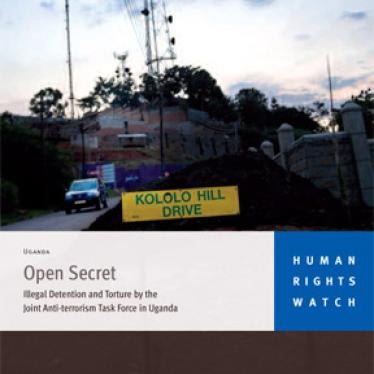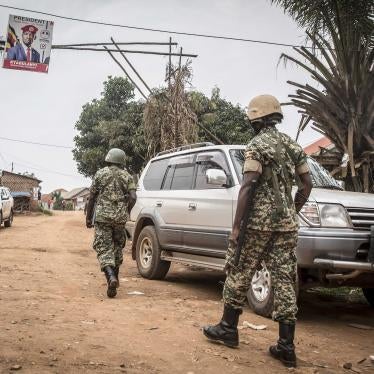The man remembers one particularly terrifying incident. One day, during the fourth month of his detention, "The soldiers started beating me with a black whip. And then one hit me very hard on the back with the flat of his hand. It felt like my heart would burst out of my chest." Three months and more abuse later, he was freed without charge.
This account (the man's identity was withheld for his protection) and others are contained in a new Human Rights Watch report that provides compelling evidence that Ugandan authorities unlawfully detain and torture alleged rebels and terrorists. Most of the mistreatment occurs at an illegal detention facility run by the government's Joint Anti-Terrorism Task Force (JATT) at its headquarters in Kololo, a wealthy suburb of Kampala.
Human Rights Watch found that over the past two years, JATT forces tortured at least 25 suspects during interrogations. There is evidence that three died from injuries sustained during interrogations and one was gunned down by men who were known to work with JATT while he was at his home. The whereabouts of five others last seen in the unit's custody remain unknown. All told, the report documents that the unit illegally detained more than 100 people during the two-year period investigated.
The report is based on in-depth interviews with 25 victims, as well family members of "disappeared" or missing people, religious leaders, members of Parliament, lawyers, human rights activists, journalists, foreign diplomats and government officials.
The Ugandan government has defended its anti-terror activities, citing a threat from indigenous rebel movements and extremist groups such as al-Qaeda. According to the chief of military intelligence, Ugandan forces have received counter-terrorism training and aid from several countries, including the United States, the United Kingdom, Israel and South Africa.
The accounts of mistreatment were detailed. Some of the people interviewed reported that they were tortured in sessions lasting several hours, repeated over several days by the same men, in front of other detainees who were also being mistreated. Detainees said JATT personnel beat them with batons, pistols, whips, shoes, chairs, and other objects. Several were beaten until they lost consciousness. One man described blood flowing from his ears after being beaten on the head and ears over a period of several days.
These people also described instances of "invisible torture." Such techniques, which are designed to leave no physical marks of abuse, include forcing detainees to sit in stress positions, repeatedly pouring jerry cans of water over detainees, forcing them to sit in water for prolonged periods of time, and rubbing chili pepper into the eyes, nose and mouth. One said that the JATT guards immobilized him and then smeared the burning pepper into his eyes. "The pain was too much and at this point I could not see anything," he said. "Then they resumed the beating and I could not tell now who was beating who."
The Ugandan government told Human Rights Watch that JATT's priority is defeating a Muslim rebel movement called the Allied Democratic Forces (ADF). Based in the Democratic Republic of Congo, the ADF is an alliance between the nationalist National Army for the Liberation of Uganda and disgruntled elements within the Islamist Tabliq sect who aim to establish an Islamic state in Uganda. Ugandan officials also said the JATT investigates individuals linked to al-Qaeda. But no alleged Al-Qaeda suspect has ever been charged with terrorism in Uganda, the HRW report says.
None of the 25 detainees interviewed about their detention in Kololo had been brought before a magistrate at any time while in JATT custody -- nor had anyone detained with them, as far as they could tell. Some of them eventually were charged with terrorism or treason; others were freed without charge.
Uganda's chief of military intelligence, Brig. James Mugira, told Human Rights Watch that JATT forces do not torture suspects. He conceded that interrogations could be "harsh, such as denying sleep." When asked about deaths in custody by JATT, he said that "nobody can torture someone to death under this government." He added that he would investigate all allegations of mistreatment of detainees by his staff and that he has implemented a new process of "screening" arrests and detentions by JATT.
Fact File
Over the past two years, JATT forces tortured at least 25 suspects during interrogations.
Four suspects died at the hands of JATT, and the whereabouts of five others last seen in the unit's custody remain unknown.
The 1995 Ugandan constitution explicitly prohibits holding individuals in places, like the JATT facility in Kololo, which is not listed as a site of detention by the Minister of Internal Affairs as required by law.
Of the 106 named individuals detained by JATT documented by Human Rights Watch, all but two were Muslims. Muslims make up about 12 percent of the population in Uganda, which is predominantly Christian.
Recommendations to the Ugandan Government
- Cease illegal detention and torture of suspects and respect criminal procedure at each stage of any criminal investigation or counterterrorism operation.
- Take all individuals arrested to recognized, legally acknowledged locations, where their detention can be monitored.
- Disband intelligence agencies, such as JATT, that have not been created under an act of Parliament as required by the constitution.
- Investigate and prosecute human rights violations by government security, police, armed forces, and other security organizations such as JATT.
- Compensate victims of torture, ill-treatment and arbitrary detention swiftly and adequately.
- Undertake a prompt and comprehensive review of national legislation governing treason, terrorism, and other public order charges to ensure compliance with international human rights standards.
- Ratify the Optional Protocol to the Convention against Torture.






